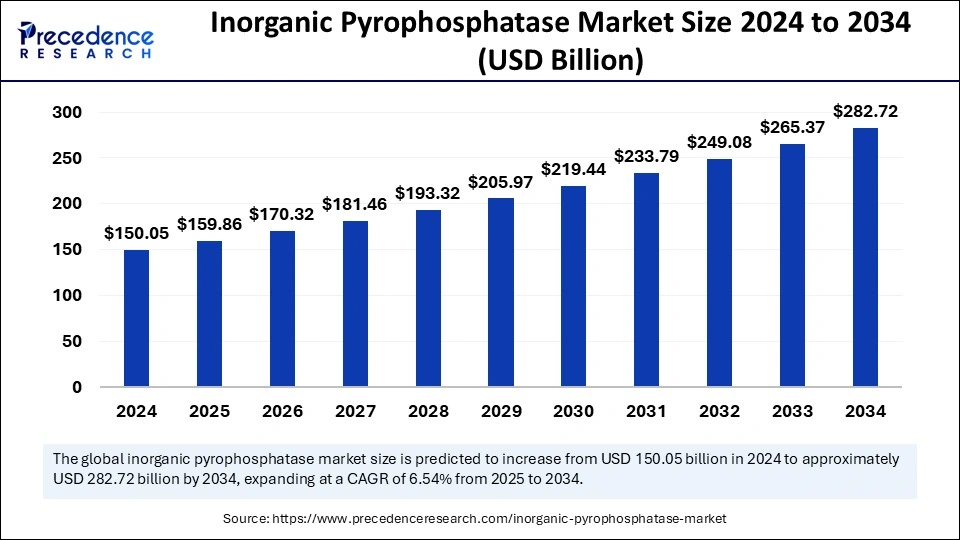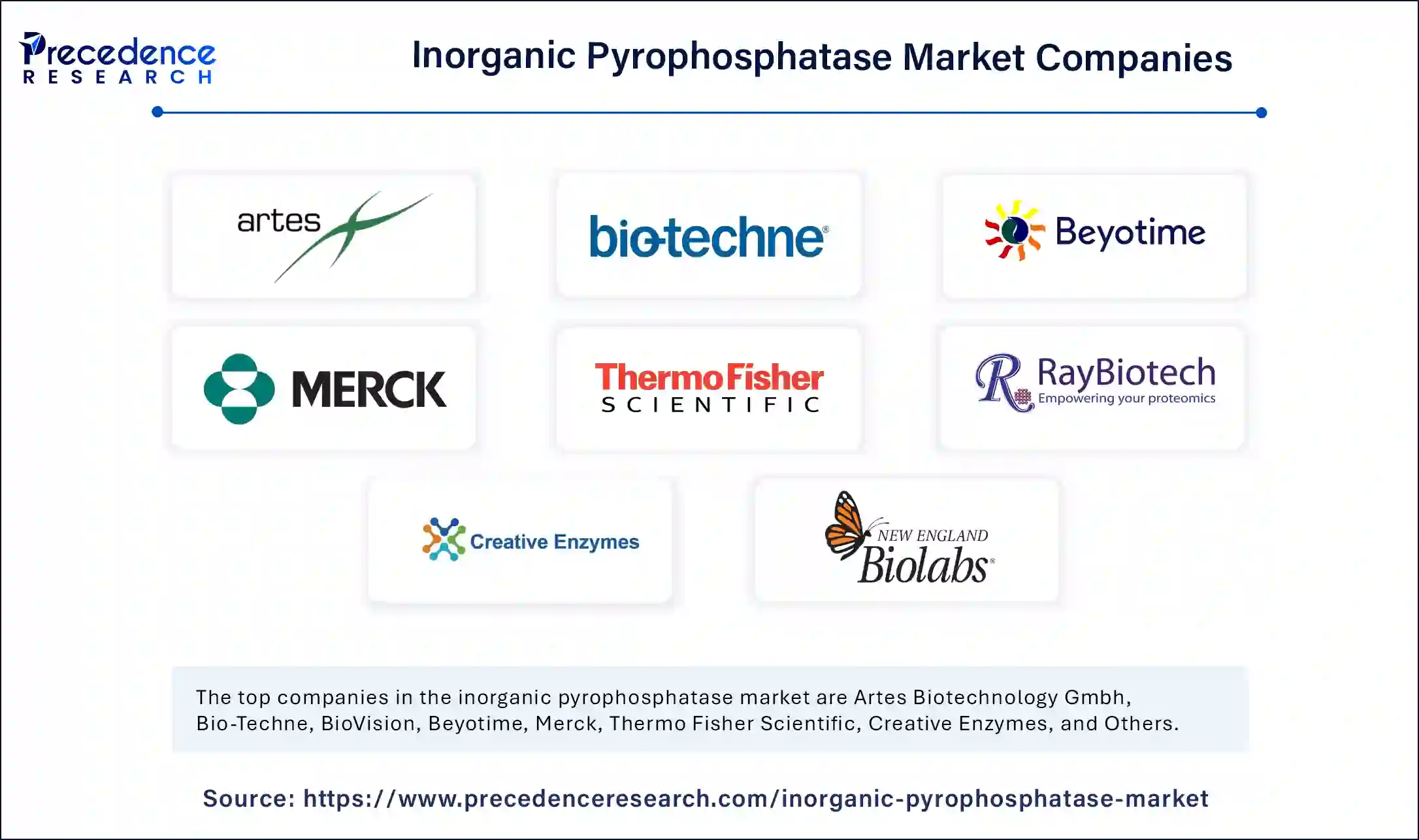The global inorganic pyrophosphatase market size is accounted to cross around USD 282.72 billion by 2034 increasing from USD 150.05 billion in 2024, with a CAGR of 6.54%.

Get a Free Sample Copy of the Report@ https://www.precedenceresearch.com/sample/5814
Inorganic Pyrophosphatase Market Key Points
-
North America captured the largest share of the global inorganic pyrophosphatase market, with 36% in 2024.
-
Asia Pacific is set to grow at the fastest CAGR from 2025 to 2034.
-
The European market is expected to show considerable growth during the forecast period.
-
The recombinant inorganic pyrophosphatase product type dominated the market in 2024.
-
The native inorganic pyrophosphatase segment is anticipated to grow rapidly during the forecast period.
-
Biomedical research accounted for the largest application share in 2024.
-
Pharmaceutical development is projected to see the fastest growth in the forecast years.
-
By formulation type, liquid formulations dominated the market in 2024.
-
Lyophilized powder formulations are expected to grow notably during the forecast period.
-
Academic and research institutes represented the largest end-user segment in 2024.
-
The pharmaceutical and biotechnology companies segment is expected to grow at the fastest rate.
-
The online suppliers segment led the market in 2024 by sales channel.
-
Direct sales by manufacturers are forecasted to expand at a significant CAGR over the coming years.
Impact of AI on the Inorganic Pyrophosphatase Market
AI is playing a pivotal role in the Inorganic Pyrophosphatase Market, particularly in accelerating drug discovery, enhancing biological data analysis, and optimizing biotechnological processes. Machine learning and deep learning algorithms are utilized to analyze vast datasets, identifying potential drug candidates or enzyme inhibitors for therapeutic development.
AI also aids in predicting enzyme behavior, understanding their role in disease mechanisms, and simulating their activity in various biological environments, which supports more targeted and effective therapies.
Furthermore, AI-driven automation in research and development is improving efficiency in the discovery of new applications and formulations of inorganic pyrophosphatases. In personalized medicine, AI models can analyze patient data to tailor treatments based on individual genetic profiles, leading to more effective therapies.
Additionally, AI is optimizing manufacturing processes for recombinant pyrophosphatase, enhancing production efficiency and reducing costs, which is vital for both research and commercial applications in the biopharmaceutical industry.
Inorganic Pyrophosphatase Market Growth Factors
The growth of the Inorganic Pyrophosphatase Market is primarily driven by the increasing demand for enzyme-based therapeutics and their role in various biotechnological applications. As the need for efficient treatments in areas such as cancer, metabolic disorders, and other chronic conditions grows, the focus on enzymes like inorganic pyrophosphatases that regulate cellular energy is expanding. The growing research in drug discovery, particularly in the biopharmaceutical sector, further accelerates the market, with advancements in recombinant protein production and enzyme-based therapies.
Additionally, the expanding biotechnology and pharmaceutical industries are boosting the demand for inorganic pyrophosphatases. Increased investment in R&D, coupled with technological advancements in enzyme production and bioprocessing, is facilitating market growth. Furthermore, the rising prevalence of diseases linked to enzyme imbalances and the continuous search for more effective treatment options are propelling the development and application of inorganic pyrophosphatases in both clinical and commercial settings.
Market Scope
| Report Coverage | Details |
| Market Size by 2034 | USD 282.72 Billion |
| Market Size in 2025 | USD 159.86 Billion |
| Market Size in 2024 | USD 150.05 Billion |
| Market Growth Rate from 2025 to 2034 | CAGR of 6.54% |
| Dominating Region | North America |
| Fastest Growing Region | Asia Pacific |
| Base Year | 2024 |
| Forecast Period | 2025 to 2034 |
| Segments Covered | Product Type, Application, Formulation Type, End-User, Sales Channel, and Regions. |
| Regions Covered | North America, Europe, Asia-Pacific, Latin America, and the Middle East & Africa. |
Market Dynamics
Drivers
Several factors are driving the growth of the inorganic pyrophosphatase market. The increasing demand for enzyme-based therapies and diagnostics in the pharmaceutical and biotechnology industries is one of the key drivers. Additionally, advancements in recombinant enzyme production technologies, such as protein engineering and expression systems, are enabling the development of more effective and cost-efficient inorganic pyrophosphatases. The growing interest in renewable energy sources, especially biofuels, is also driving the demand for these enzymes, as they are critical in the metabolic processes used in biofuel production.
Opportunities
The inorganic pyrophosphatase market presents numerous opportunities, particularly in the fields of personalized medicine, drug discovery, and renewable energy. With the increasing adoption of artificial intelligence in research and development, there are opportunities to accelerate drug discovery processes and enzyme optimization. Additionally, the rising demand for biofuels and other renewable energy sources presents a significant market opportunity for inorganic pyrophosphatases, as they play a key role in the metabolic pathways that produce biofuels. There is also a growing need for more efficient diagnostic tools, which inorganic pyrophosphatases can help address.
Challenges
Despite the growth potential, the inorganic pyrophosphatase market faces several challenges. One of the primary hurdles is the high cost associated with the production and purification of recombinant enzymes. Additionally, the market faces competition from other types of enzymes and technologies that may offer similar or superior benefits in certain applications. Regulatory hurdles, particularly in the pharmaceutical and biotechnology sectors, can also slow down the development and commercialization of inorganic pyrophosphatase-based products. Furthermore, scaling up production for industrial applications while maintaining consistency and quality remains a significant challenge.
Regional Insights
The inorganic pyrophosphatase market is showing varied growth across different regions. North America holds the largest share of the market due to its advanced pharmaceutical and biotechnology industries, strong research capabilities, and early adoption of new technologies. Europe is also experiencing notable growth, driven by research institutions and a strong focus on sustainable energy solutions. The Asia Pacific region is expected to witness the fastest growth due to increased investments in biotechnological research, rising healthcare demand, and growing interest in renewable energy sources. As countries in the region invest more in biotechnology and pharmaceuticals, the market for inorganic pyrophosphatases is expected to expand rapidly in the coming years.
Inorganic Pyrophosphatase Market Companies

- Artes Biotechnology Gmbh
- Bio-Techne
- BioVision
- Beyotime
- Merck
- Thermo Fisher Scientific, Inc.
- RayBiotech
- Creative Enzymes
- New England Biolabs
Leader’s Announcements
- In January 2025, 1cBio Inc., an arising biotech company focused on significant unmet needs by developing precision medicines announced an exclusive worldwide licensing agreement with Alesta Pharmaceuticals allowing the latter for developing, commercializing and manufacturing OC-1(also known as ALE1) which is an orally active therapeutic candidate for hypophosphatasia (HPP). Andrew Wong, Chief Executive Officer at 1cBio, said that, “We are excited to partner with Alesta Therapeutics, who is pioneering the development of transformative medicines for rare disease and can help us to reach HPP patients more rapidly. OC-1 is another example of the 1cBio team’s capabilities to identify white spaces in disease treatments and develop highly differentiated molecules for precision medicine. We look forward to collaborating with Alesta’s innovative development team to efficiently progress a potentially first-in-class, oral therapy for HPP patients.”
Recent Developments
- In January 2025, Alesta Therapeutics, a leading biotechnology company focused on developing transformative small molecule therapies for rare diseases, declared the successful closing of an oversubscribed Series A funding round further securing €65 million.
Segments Covered in the Report
By Product Type
- Recombinant Inorganic Pyrophosphatase
- Native Inorganic Pyrophosphatase
By Application
- Biochemical Research
- Pharmaceutical Development
- Clinical Diagnostics
- Agricultural Biotechnology
By Formulation Type
- Liquid Formulation
- Lyophilized Powder
By End-User
- Academic and Research Institutes
- Pharmaceutical and Biotechnology Companies
- Diagnostics Laboratories
- Contract Research Organizations (CROs)
By Sales Channel
- Direct Sales by Manufacturers
- Online Suppliers
- Distributors
- Third-Party Vendors
By Region
- North America
- Europe
- Asia Pacific
- Middle East & Africa
- Latin America
Also Read: Magnesium Stearate Market
Ready for more? Dive into the full experience on our website@ https://www.precedenceresearch.com/